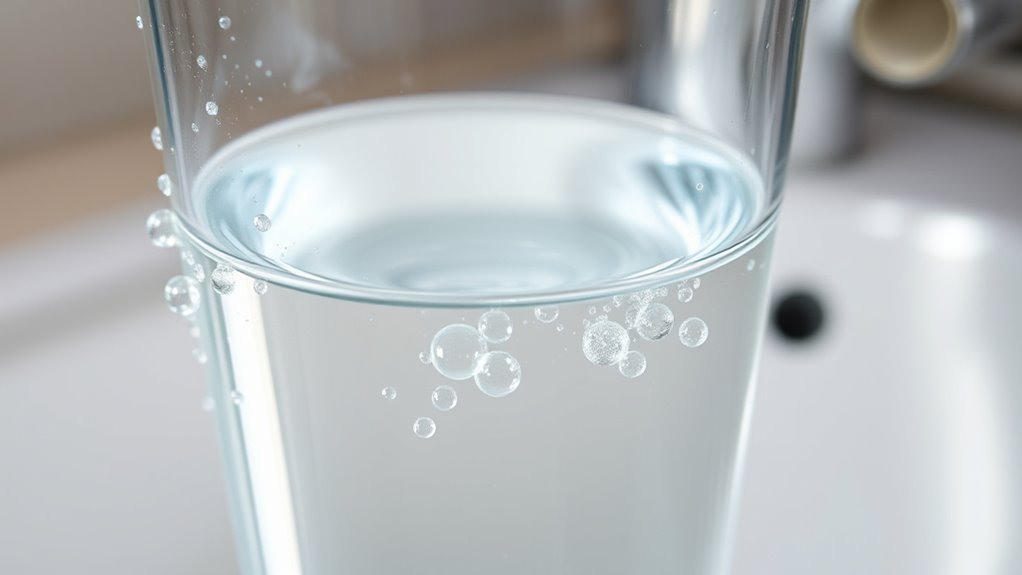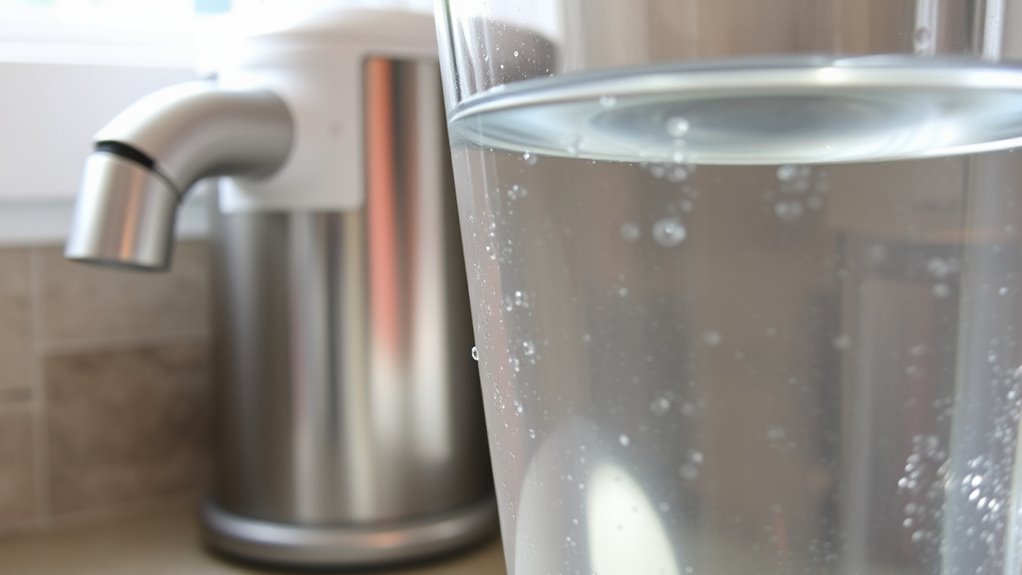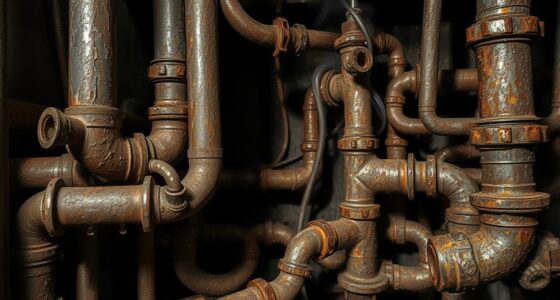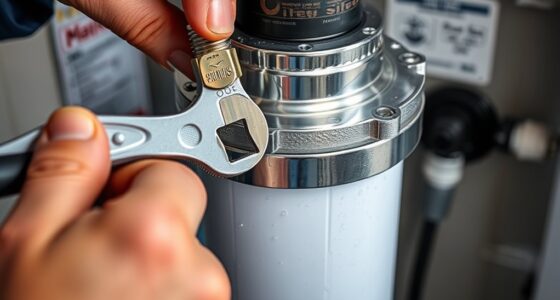If your filtered water tastes or smells bad, lingering chemicals like chlorine, minerals, or bacteria might be the cause. Your current filter may not be effectively removing these contaminants, especially if it’s old or not designed for your water source. Mineral flavors or odors from biofilm buildup can also persist if filters aren’t maintained properly. To find out more about improving your water’s taste and smell, keep exploring the possible causes and solutions.
Key Takeaways
- Residual chlorine can cause a strong smell if filters don’t effectively remove it, requiring filter replacement or upgrade.
- Mineral content like iron or calcium may produce metallic tastes if not properly filtered out.
- Biofilm buildup in filters leads to musty or stale odors, indicating the need for cleaning or replacement.
- Inadequate filtration technology or media can fail to eliminate odors and unpleasant tastes effectively.
- Changes in source water quality or contamination can introduce new flavors or smells that existing filters can’t address.

If your filtered water has an unusual taste or smell, it can be both confusing and frustrating. You might notice a strong chlorine odor or a strange mineral taste that wasn’t there before. These issues often stem from the filtration process itself or the source water. Understanding why these flavors and odors appear can help you troubleshoot and improve your drinking water quality.
Unusual tastes or odors in filtered water often indicate filtration issues or source water changes.
A common cause of a chlorine odor in your filtered water is residual chlorine that remains after treatment. Many municipal water supplies use chlorine to disinfect water, and even after filtration, small amounts can linger. If your filter isn’t designed to specifically remove chlorine, this smell can persist, giving your water a chemical-like aroma. This isn’t necessarily harmful, but it can be unpleasant and make you question the safety of your water. Some filters include activated carbon components that are highly effective at absorbing chlorine, so if you’re still experiencing the odor, it might be time to upgrade or replace your filter.
Similarly, a mineral taste is often related to the natural elements present in your source water. These minerals—like calcium, magnesium, or iron—can give water a metallic or earthy flavor. When your filtration system isn’t designed to target specific minerals, these tastes can become more noticeable. Sometimes, mineral-rich water can taste more “earthy” or “metallic,” especially if the filter isn’t handling those minerals effectively. Regular maintenance, such as backwashing or replacing filters, can help reduce these mineral flavors. Using filters with specialized media, like ion exchange resins, can also help remove excess minerals and improve taste.
Another factor that can influence taste and smell is biofilm buildup inside your filtration system. Over time, bacteria can grow in moist, dark areas of filters or cartridges, leading to musty or foul odors. If you notice a sour or stale smell, it’s likely time to clean or replace your filter. Regularly maintaining your system prevents these odors from developing and keeps your water fresh.
In addition, utilizing HEPA filtration or other advanced filtration technologies can further enhance the removal of odors and particles that affect taste and smell. Sometimes, the source water itself can change. Seasonal shifts, pipe corrosion, or contamination can introduce new tastes or smells that your current filter isn’t fully equipped to handle. In these cases, upgrading your filtration system or adding supplemental filters might be necessary. Always testing your water periodically can help identify changes and ensure your filtration setup is adequate.
Frequently Asked Questions
Can Filter Replacement Affect Water Taste?
Yes, filter replacement can affect water taste. If you don’t replace your filter within its recommended filter lifespan or follow the proper replacement frequency, it can become clogged or less effective at removing impurities. This can lead to stale or bad-tasting water. Make sure you change your filter regularly based on your usage to maintain fresh, clean-tasting water and prevent unpleasant odors or flavors.
How Do Mineral Deposits Impact Filtered Water?
Mineral deposits can impact your filtered water by causing mineral buildup inside your filter, which may lead to cloudiness and decreased water clarity. As minerals accumulate, they can alter the taste, making it metallic or off-putting. To prevent this, regularly clean or replace your filter, especially if you notice changes in water clarity or taste. Doing so helps preserve a fresh, clean flavor and ensures your filtration system works efficiently.
Does Water Temperature Influence Smell or Taste?
Water temperature definitely influences your taste perception. When water is colder, it can mask some flavors and odors, making it seem fresher. Warmer water, however, tends to enhance certain tastes and smells, which might make any impurities more noticeable. So, if your filtered water smells or tastes off, try chilling it first. Adjusting the temperature can help you better evaluate its true flavor and identify any lingering issues.
Can Bacteria Grow in My Water Filter?
Bacterial growth can occur in your water filter if you neglect regular filter maintenance. Studies show that filters left unused or not cleaned properly can harbor harmful bacteria, which may cause bad taste or smell. To prevent this, change your filter as recommended and clean it regularly. Proper filter maintenance guarantees your water stays fresh, safe, and free from bacteria that can cause unpleasant odors or health issues.
Is It Normal for Filtered Water to Have a Slight Odor?
It’s normal for filtered water to have a slight odor sometimes, especially if the filter is new or hasn’t been used recently. This filter odor can affect water freshness, making it seem less appealing. To reduce this, replace your filter regularly and clean your water dispenser. Proper maintenance helps guarantee your filtered water tastes better and stays fresh, preventing any unwanted odors from lingering.
Conclusion
Think of your filtered water like a clear lake—you want it pure and invigorating. When it tastes or smells off, it’s like finding a leaf floating on the surface. Just like skimming that leaf restores the lake’s beauty, checking your filter or replacing it can restore your water’s crisp taste. Remember, regular maintenance keeps your water as inviting as a pristine pond, so you can enjoy every sip without worry.









